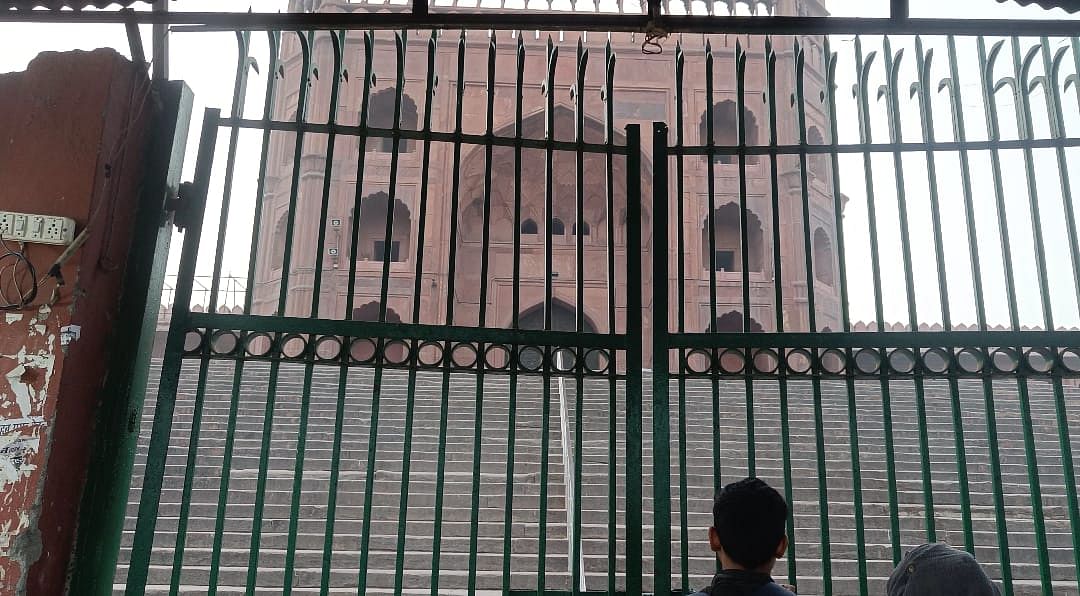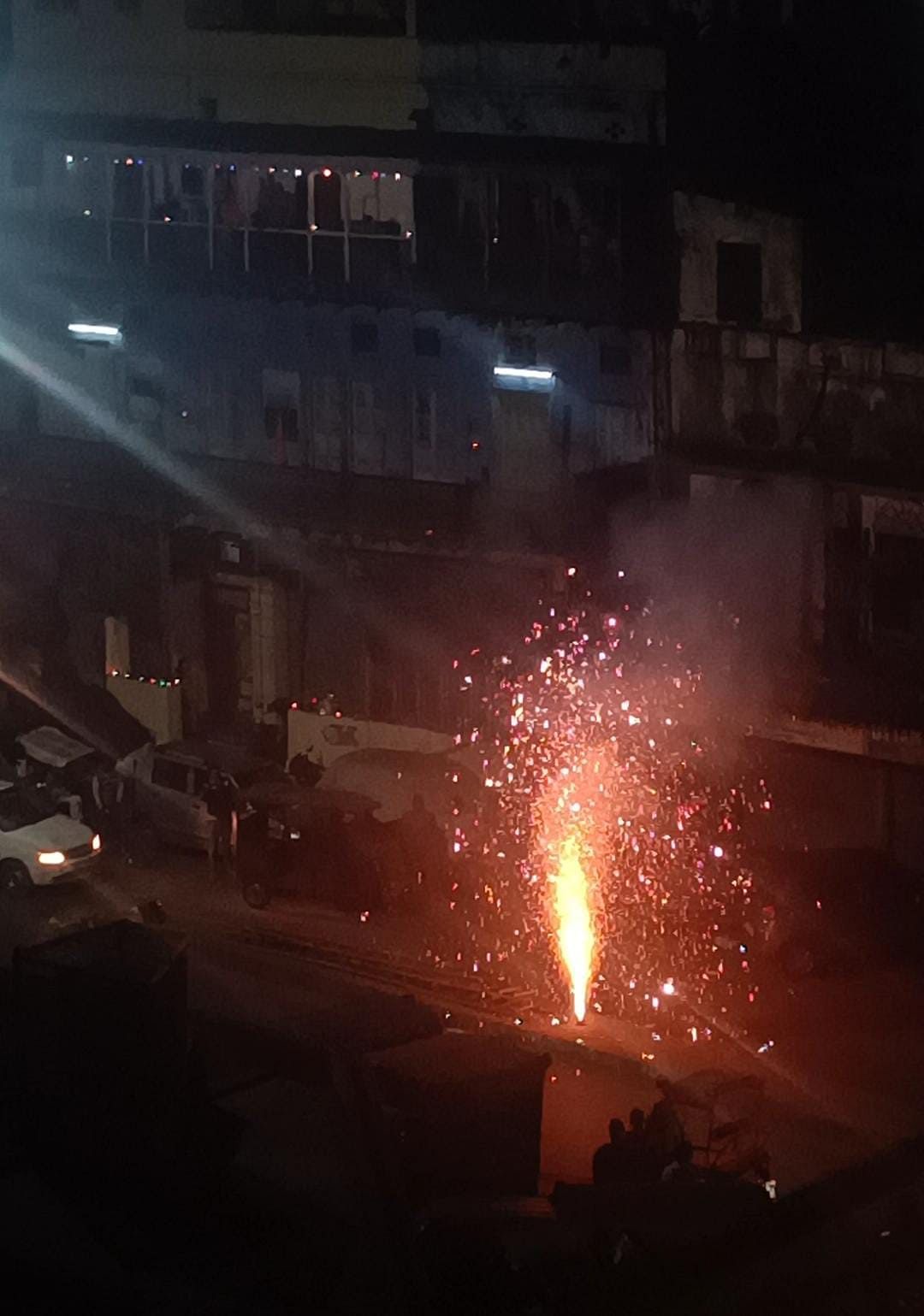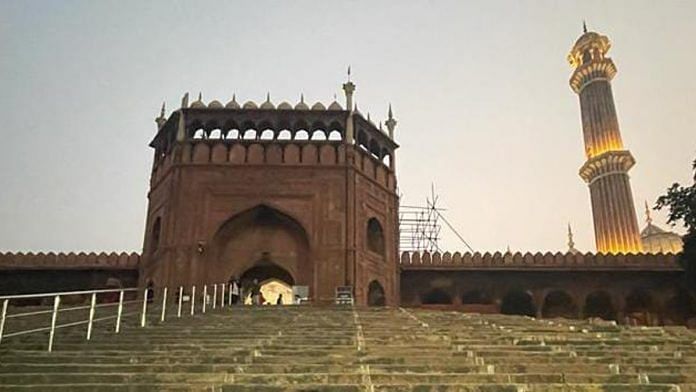New Delhi: On Monday, the day of the Ram Lalla ‘pran pratishtha’ ceremony at Ayodhya, two gates of the 380-year-old Jama Masjid in Old Delhi remained shut. The stairs leading up to the mosque — usually full of people — were empty and the roads in the area largely desolate.
When a Vietnamese tourist seemingly soaked in the temple revelry — he was sporting a teeka and a ‘Jai Shri Ram’ saffron scarf — tried to enter through another gate, a guard refused entry. “It is closed today,” he said.
When ThePrint asked a group of people seated outside the mosque premises around 6 pm why the gates were closed, an elderly person, who didn’t wish to reveal his name, said it was because “someone stole a phone”.
Another person refused to answer.
Have the gates been closed before in the recent past? Most shook their heads no.
“It is because it is 22 January,” a burqa-clad woman sitting in an auto finally said. “We don’t want any unnecessary fights. It is their day, let them celebrate.”

On 9 January, BJP Minority Morcha national president Jamal Siddiqui had said they plan to light diyas at famous mosques and shrines, including Delhi’s Jama Masjid and Nizamuddin Aulia Dargah, to mark the ‘pran pratishtha’ ceremony.
Earlier, RSS national executive member Indresh Kumar had appealed to Muslims to chant ‘Jai Shri Ram’ at their places of worship on the day of the consecration.
Kumar, the chief patron of the RSS-linked Muslim Rashtriya Manch, had also called on non-Hindus to participate in the consecration event by offering prayers for peace, harmony and brotherhood at their places of worship.
The auto driver at the Jama Masjid said the gates were “closed yesterday too”.
“They (the Hindu community) took out a jalsa from here. Nothing untoward occurred because there were police all around. People have been living here together since a long time, I think they understand that,” he added. “Had it been some other place, a riot could have broken out.”
The second passenger ended the discussion with a sigh. “Bura toh lagta hai par kya hi kar saktein hain (Of course, this feels bad but what can be done)?”
The big-ticket Ram temple event in Ayodhya was a subject of grand celebrations in national capital Delhi, as in different parts of India. Scores of vehicles on the road had the saffron flag that became omnipresent in the run-up to the event, as did homes and other buildings.
Loud music was played at community events organised to mark the day, even as many — like the family above — chose to keep the celebrations personal.
The Muslims of the capital, who comprise 13 percent of the population (2011 census), watched the celebrations unfold with a mixed sentiment.
While some expressed hurt, remembering how the Babri masjid was brought down by Hindu fundamentalists in 1992, others spoke of triumphalist overtures being made by certain quarters — like chants of “Jai Shri Ram” lobbed at Muslim passersby — and emphasised the need to keep peace.
Some denied there was any rancour around the event at all. But there were also those who said the sense of alienation was undeniable.
Also Read: Time to end ‘purani dushmaniyan’, says top imam facing flak for attending ‘pran pratishtha’
‘Don’t want unnecessary fights’
Delhi’s Chandni Chowk is divided by a broken road that separates the Hindu-majority locality of Dariba Kalan from Gate No. 3 of the Jama Masjid in Old Delhi.
The desolation around the Jama Masjid offered a striking contrast to the lanes of Dariba Kalan, which were all decked up with the saffron flags, with many residents hosting bhandaras.
Outside a shop, a man and a girl distributed food and sweets as children danced to the beats of the devotional hymn, ‘Ram Siya Ram’. Everyone was dressed in saffron.

Opposite Jama Masjid’s Gate No. 3, amid a string of shops, a house was all lit up. Around 7 pm, a man came out to the verandah, lit up some diyas and straightened an orange flag — embossed with the chant ‘Jai Shri Ram’ — hoisted on the house gate.
As he watched over, his children, wearing orange scarves, lit a charki — a firecracker that throws out and spins in a spectacular lake of sparks before sputtering to a stop.
From afar, near the gate of the Jama Masjid, a boy watched the family rejoicing.
Glances were exchanged, but silence prevailed.
‘Sense of betrayal’
In areas around Nizammudin, everyone went about their work Monday evening, and many people refused to comment on the temple event.
Fareed Nizami, the sajjad-e-nasheen (chairman) of the Nizamuddin Dargah, a Sufi shrine, denied there had been any temple-specific attempts to light diyas on the premises.
“People from all faiths come here and light lamps. No such group came specifically,” he added. “This is a place which welcomes all religions. We do not need to do something different.”
On 11 January, he added, a delegation of Sufis had met PM Modi at his official residence to present a sacred cloth to be kept at Ajmer Sharif in Rajasthan.
“We discussed a separate Sufi corridor and asked for the government’s help to take forward the Sufi tradition,” he added. “In the end, it is missions and places like these that can counter radicalism of any sort. Ours is not a place for politics. Anyone can come and light a lamp.”
In nearby Jangpura, Muslim residents said they had warned their children not to go out that day.
“I am scared to wear my skull cap and go to the mosque (Shahi masjid in Bhogal). There was an instance where a rally stopped in front of the mosque and chants were made for a minute or more,” said a 30-year-old resident of Jangpura’s Bhogal who wanted to remain anonymous.
“A few days back, a shopkeeper shouted ‘Jai Shri Ram’ to two burqa-clad women walking on the streets.”
In Jamia Nagar, located about 7 km from Jangpura, Ghulam Sarwar, a 50-year-old resident, said “the overriding emotion” in the community “is betrayal” — not by “the party in power, but the Opposition, which has chosen to do nothing”.
“It is like collective memory has taken a hit. What is the use of blaming the BJP? This (Babri demolition) happened when the Congress was in power,” he added.
“The only difference was that we felt like we had some say since we had a hissedari in the votes. We voted them to power. Now, we are afraid to even speak up.
“We don’t vote for the BJP. They don’t need our votes. We have no hope from the BJP, but neither do we have any from the Congress,” he added. “What did they do for us? They are now fighting over who got an invite and who didn’t.”
Sarwar also expressed some bitterness about the celebrations around the temple. “You say you want to forget, but you don’t let us forget. The flags, the music and the celebration.”
Sarfaraz from nearby Okhla expressed a similar sentiment.
“While one community was emotional, we were feeling alienated,” he said. “What about the rule of law? It feels like, earlier, rules were applied, and now they are being forced on us and there is nothing to be done “
Sarwar said he had seen a shift in Delhi from 1992 to 2024. “The alienation is now complete,” he added, expressing disappointment with Delhi Chief Minister Arvind Kejriwal as well.
“We voted for Kejriwal because we thought he stood for development. The same person who once claimed his grandmother said ‘Ram cannot reside in a temple constructed over a mosque’ has now said that he will take his entire family to Ayodhya,” he added.
“We are nowhere in this narrative. The Muslim has no other option but to keep quiet.”
Sarwar said everyone should be allowed to have an equal voice in a democracy. “Until when will Muslims bear the burden of upholding the flag of secularism while others unfurl saffron flags?” he added.
(Edited by Sunanda Ranjan)



